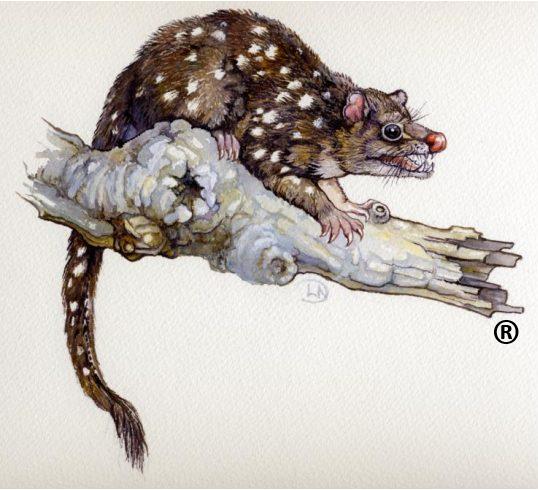Judge a society by how it treats its animals
Monday, August 29th, 2011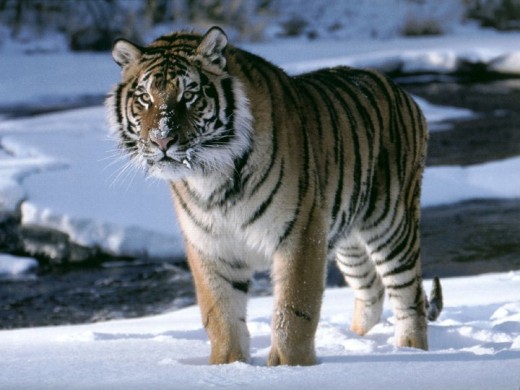 The magnificent tiger in the wild, where it belongs,
free, protected from humanity, protected from human persecution, protected from backward superstition.
A big ask of a pathogenic backward species ~ homo ‘sapiens’?
The magnificent tiger in the wild, where it belongs,
free, protected from humanity, protected from human persecution, protected from backward superstition.
A big ask of a pathogenic backward species ~ homo ‘sapiens’?.
“I hold that the more helpless a creature, the more entitled it is to protection by man from the cruelty of man”
.
“The greatness of a nation and its moral progress can be judged by the way it treats its animals.”
~Mohandas Gandhi (1869-1948)
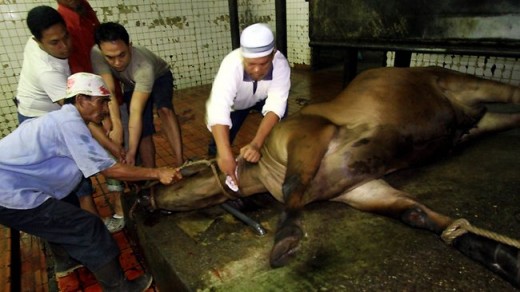 By this measure, Indonesian society’s prescription and tolerance of Dhabiha throat slitting slaughter in its abattoirs reflects a society that is barbaric, immoral, uncivilized and backward.
By this measure, Indonesian society’s prescription and tolerance of Dhabiha throat slitting slaughter in its abattoirs reflects a society that is barbaric, immoral, uncivilized and backward.
.
.
Then we have the backward cultural practice of Traditional Chinese Medicine (TCM):
.
‘Diplomat exposed Chinese tiger farm horrors’
[by Jonathan Watts, 20110827, The Age newspaper, borrowed in turn from The (UK) Guardian News & Media, ^http://www.theage.com.au/environment/animals/diplomat-exposed-chinese-tiger-farm-horrors-20110826-1jefp.html, accessed 20110829]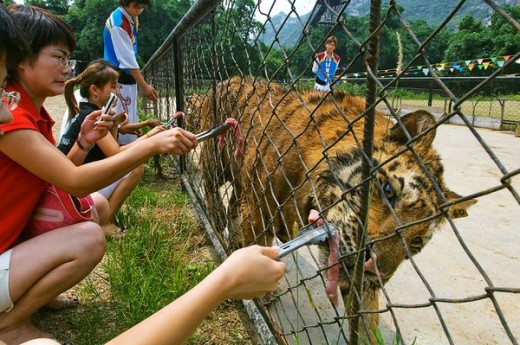 Chinese tormenting a Xiongsen Tiger
Chinese tormenting a Xiongsen Tiger
.
‘An American diplomat posed as a Korean tourist to investigate a notorious tiger breeding centre in southern China, where he saw animals whipped, made to perform ”marriage processions” and reportedly sold to be used in traditional medicines.As a result of the undercover visit to Xiongsen Tiger and Bear farm, the US government was notified of doubts about China’s conservation efforts, according to a diplomatic cable recently released by WikiLeaks.
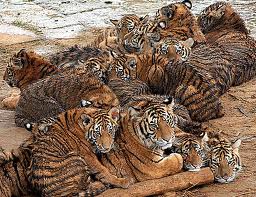 Xiongsen Tiger – a pitiful end
Xiongsen Tiger – a pitiful end
The investigation was inspired by a flurry of foreign media reports in 2007 alleging the farm offered tiger meat in its restaurant and tiger bone wine in a shop.
In a cable sent from the Guangzhou US consulate headed ”Devouring Dragon, Disappearing Tigers”, an un-named economics officer said he was initially treated with suspicion by the sales personnel in the facility. But once he convinced them he was Korean, they became eager to do business.
”The staff stated that up to three tour groups of Koreans came a day, numbering more than 30 in each group.The Koreans were among the most enthusiastic purchasers of both the black bear bile and the tiger wine.” The price of the bottles ranged from 80-896 yuan ($12-$134).
 Tiger Parts used by in barbaric chinese superstition (TCM)
Tiger Parts used by in barbaric chinese superstition (TCM).
China says it has nearly 6000 tigers in captivity, but only 50 to 60 are left in the wild. In the 1980s, China set up tiger farms to try to preserve the big cats. But conservationists have criticised the farms, accusing them of seeking primarily to produce tiger parts, which some Asians regard as aphrodisiacs.
 Packaged Traditional Chinese ‘Medicine’
Packaged Traditional Chinese ‘Medicine’
.
The visitor to the farm – which has more than 1000 tigers in its cages – described the spectacle of a tiger killing an ox in a ”training cage” purportedly set aside as a training area for animals that are to be introduced to the wild. But most of the animals appeared tame and some were used in circus-like entertainment shows, where they were beaten. Black bears – kept for their bile – were also made to join a mock Chinese marriage procession where they acted as bride and groom, he wrote.
 Xiongsen Bear and Tiger Mountain Village
(a backward cruel colosseum for human hedonistic animal sadism)
Xiongsen Bear and Tiger Mountain Village
(a backward cruel colosseum for human hedonistic animal sadism)
.
Locals told him that the farm served tiger meat and sold tiger skin, but this was denied by staff.
Nonetheless, he concludes in the cable dated July 12, 2007, that:
”The commercial nature of the farm was troubling. The large number of endangered tigers and bears present with no current plans to reintroduce them into the wild raises concern regarding the motivation of such a farm.”
.
.
 A threatened and persecuted species by backward human cultures,
reduced to the mercy of civilized humanity’s compassion and whim.
A threatened and persecuted species by backward human cultures,
reduced to the mercy of civilized humanity’s compassion and whim.
.
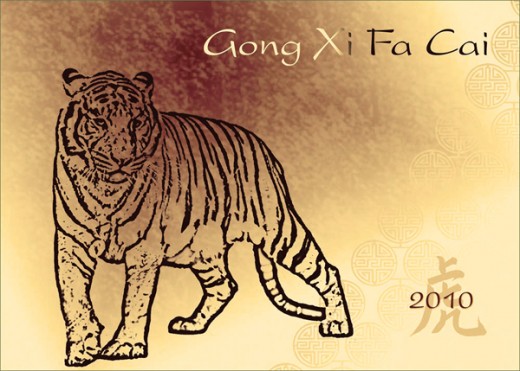 Gong Xi Fa Cai
[Chinese Year of the Tiger ~ a harbinger of mass slaughter]
Gong Xi Fa Cai
[Chinese Year of the Tiger ~ a harbinger of mass slaughter]
.
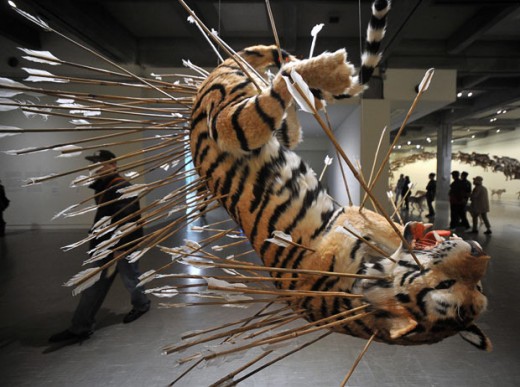 2010 was the Chinese Zodiac Year of the Tiger
2010 was the Chinese Zodiac Year of the Tiger
.
.
Footnote
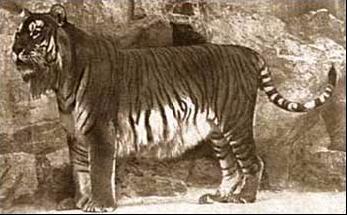 Rare photo of a Caspian Tiger
Rare photo of a Caspian Tiger
.
Until the 19th century, Caspian tigers still inhabited wide spaces of Western and Central Asia. In the mid-19th century, Caspian tigers were killed 180 km northeast of Atbasar, Kazakhstan and as far North as near Barnaul, Russia.
The only reported Caspian tiger from Iraq was killed near Mosul in 1887. In 1899, the last Caspian tiger near the Lop Nur basin in Xinjiang, China, was killed. Caspian tigers disappeared from the Tarim River basin in Xinjiang, China, by the 1920s.
The last record of the Caspian tiger on the Ili River, their last stronghold in the region of Lake Balkhash, Kazakhstan, dates to 1948.
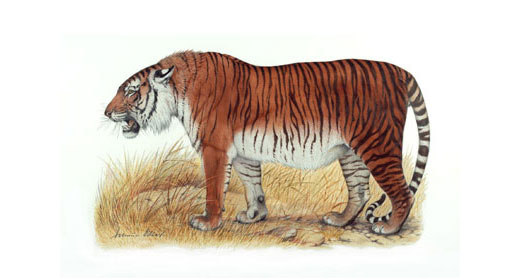 Caspian Tigers now are extinct. They only exist in illustration.
Caspian Tigers now are extinct. They only exist in illustration.
.
.
– end of article –


